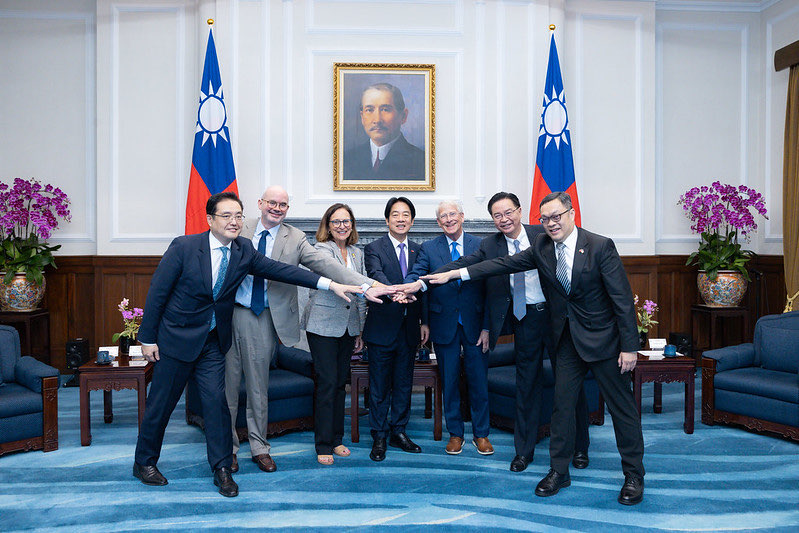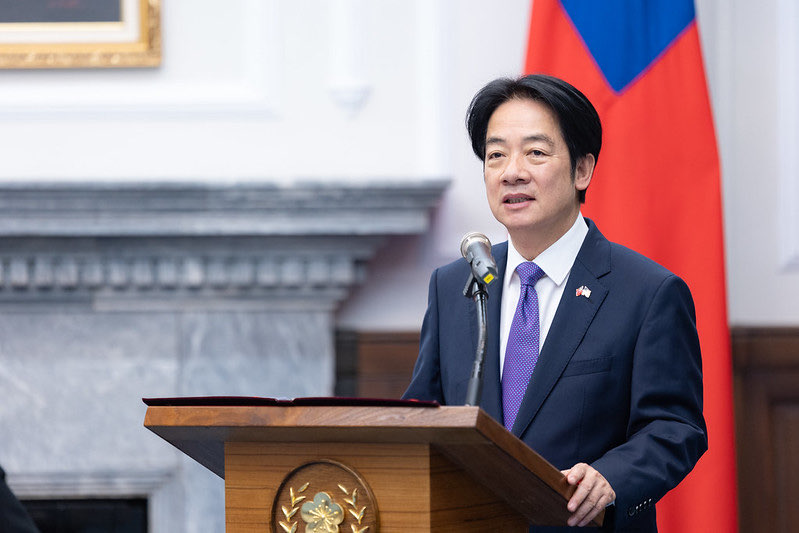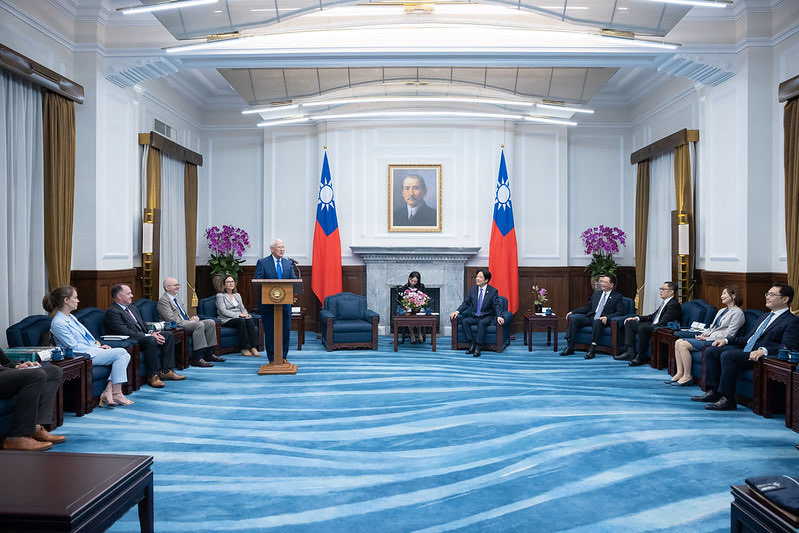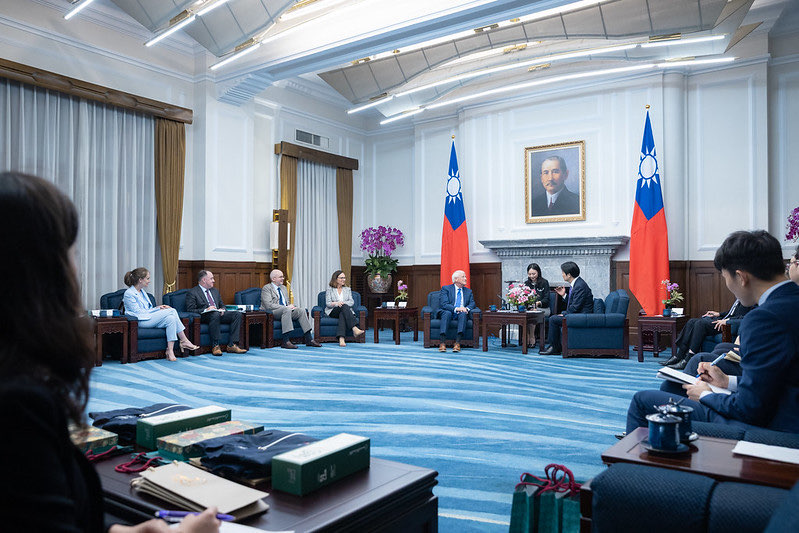News & activities
 News releases
News releases
On the afternoon of August 29, President Lai Ching-te met with a delegation led by US Senate Armed Services Committee Chairman Roger Wicker. In remarks, President Lai thanked the Senate Armed Services Committee for the strong backing it has lent Taiwan over the years. The president emphasized that Taiwan will continue strengthening its defense capabilities, demonstrating determination to protect the homeland. He stated that Taiwan will continue to deepen the partnership across all areas with the US and others in the democratic community, serving as a stabilizing force in the pursuit of global prosperity and development.
A translation of President Lai’s remarks follows:
First, on behalf of the government and people of the Republic of China (Taiwan), I would like to welcome Chairman Wicker and Senator Deb Fischer to Taiwan. This is Senator Wicker’s first visit to Taiwan in his capacity as chairman of the Senate Armed Services Committee, making his trip all the more meaningful. For a chair of this committee to be leading a delegation to Taiwan once again after nine years is deeply significant, demonstrating the continuity of security cooperation between Taiwan and the US over the years.
I would like to thank the Senate Armed Services Committee for supporting Taiwan through concrete action. I would also like to take this opportunity to extend my congratulations to Chairman Wicker on receiving Freedom House’s Leadership Award this year, which is a recognition of his efforts all of these years in promoting democracy, freedom and human rights. I sincerely thank Chairman Wicker, Senator Fischer, and the Senate Armed Services Committee for the strong backing they have lent Taiwan.
Under Chairman Wicker’s leadership, the Senate Armed Services Committee has held hearings, promoted legislation, and has urged the executive branch to enhance Taiwan-US security cooperation. The annual National Defense Authorization Acts passed by Congress in recent years have included initiatives to strengthen Taiwan’s security, which is significant for Taiwan, and in particular the Foreign Military Financing program has helped Taiwan further improve its national defense capabilities. There is now a clear international consensus that peace and stability across the Taiwan Strait are essential for global security and prosperity. Taiwan stands on the front line of the first island chain in the Indo-Pacific and directly faces the threat of authoritarianism. We are determined to protect our homeland, and we are well aware of the responsibility of maintaining peace and stability in the Indo-Pacific.
In defense, Taiwan will continue strengthening its capabilities to ensure peace and stability across the Taiwan Strait. Next year’s defense budget will exceed three percent of GDP, and we aim to reach five percent of GDP, aligned with NATO standards, by 2030. Adhering to our asymmetric strategy, we hope, through military procurement from the US or by boosting our self-sufficiency in national defense, to deepen cooperation with the US, from planning and design to production and manufacturing, so as to advance a closer defense partnership between our two nations.
In terms of diplomacy, Taiwan will continue promoting integrated diplomacy through values-based diplomacy and our Allies Prosperity Project, and collaborating with the democratic community in areas including national defense, national security, intelligence, countering disinformation, and cybersecurity. Standing side by side with those democracies, we will demonstrate the strength of deterrence and, by enhancing our capabilities, we will jointly maintain the peace and stability of the region.
As for the economic aspect, Taiwan will strengthen its economic security and resilience, enabling our industries to expand their global presence and international markets from a solid base here in Taiwan, while shifting away from the previous concentration of investment in China. Investment in China, which accounted for 83.8 percent of all outbound investment in 2010, dropped to about seven percent last year. The US has now become Taiwan’s largest investment destination and its second-largest trading partner, while Taiwan is the seventh largest trading partner of the US. Additionally, over 90 percent of US companies here plan on maintaining their investments in Taiwan. We hope that the ongoing Taiwan-US tariff negotiations will help resolve trade deficit issues and enhance bilateral economic and trade cooperation.
In terms of cross-strait policy, Taiwan is focused on maintaining the status quo. We will safeguard our free and democratic constitutional system. We stand by the commitment that the Republic of China and the People’s Republic of China are not subordinate to each other, as well as by the commitment to resist annexation or encroachment upon our sovereignty. I emphasize that the future of the Republic of China (Taiwan) must be decided by its 23 million people. Taiwan is willing, under the principles of parity and dignity, to conduct exchanges and cooperate with China to promote mutual prosperity and peaceful development across the strait.
The Taiwan Relations Act (TRA) was passed by the US Congress in 1979. Since then, every US president, regardless of party affiliation, has built upon the foundation of the TRA and the Six Assurances to assist Taiwan in bolstering its defense capabilities. Looking forward, Taiwan hopes to build further on this foundation to enhance cooperation with the US in security and prosperity, as well as in other areas.
I once again thank Chairman Wicker and Senator Fischer for visiting Taiwan. I believe that with our bilateral efforts and your support, Taiwan and the US will continue to deepen the partnership across all areas, serving as a stabilizing force in the pursuit of global prosperity and development.
Chairman Wicker then delivered remarks, a transcript of which follows:
Thank you very much, Mr. President, for welcoming Senator Fisher and me in such a distinguished and delightful way, and in such a beautiful building and such a beautiful room; this is a beautiful and profound moment for me. We come here from the United States, bringing a message from the Congress of commitment, of long-term friendship, and a determination that a free country like Taiwan absolutely has the right to remain free and preserve self-determination.
I look forward to our conversation. Let me tell you just a little about this delegation. Regrettably, it was to be a seven-member delegation, rather than just the two of us. We had a bipartisan group of members of the House of Representatives who were also going to attend, and at a relatively late moment in the preparations, the delegation ceased to be bipartisan. Our Democrat was unable to attend, and because of the House rules, none of the House members were able to come. But I bring you greetings on behalf of them also. This is actually the ninth day of our trip, and there will be a few more days. We’ll be here tomorrow in Taipei. This is the ninth day of our trip. We visited INDOPACOM in Hawaii, then on to Guam, Palau, Tinian, the Philippines, and then here today. This is a highlight of our trip. And we are here to get a better understanding of the needs and the concerns of our dear friends from Taiwan, but we are also here principally to bring a strong message of friendship and mutual defense for our two democracies.
The president was correct to mention the Taiwan Relations Act, which has been reinforced and reiterated numerous times by our government and along with President Reagan’s Six Assurances, which came after his inauguration as president in 1981. On top of that, for the last two years, our National Defense Authorization Act has built upon that assurance, and added to it. In the 2024 National Defense Authorization Act, with the Taiwan Enhanced Resilience Act, and then last year with the Taiwan Security Assistance Initiative that complemented the authorities we put into place in 2024. And I am happy to say that this year’s National Defense Authorization Act, which we will begin debating on Tuesday of next week, will once again enhance that assurance.
That said, there is much to be discussed, and much for Senator Fischer and me to learn. So we look forward to a full discussion and a reiteration to the wonderful people of Taiwan of our determination to remain the best of friends and to defend the freedom of everyone in both of our great countries. Thank you very much.
Senator Fischer then delivered remarks, a transcript of which follows:
Good afternoon. Thank you, Mr. President, for having us here today, and I would like to extend my gratitude to you and to the Taiwanese people for your warmth, your hospitality, and your friendship. In the United States Senate, we understand the gravity of the challenges that Taiwan faces. We also recognize that the world is more dangerous today than at times since World War II. That reality demands seriousness and resolve.
It requires us in Washington and here in Taipei to invest wisely, to strengthen deterrence, and to ensure our defenses are ready for the threats of tomorrow. I am proud that the Senate Armed Services Committee has made that commitment a top priority. Taiwan, for its part, has made important progress in bolstering its self-defense capabilities in recent years. And I look forward to hearing more about that progress and exploring areas where we can deepen our cooperation and accelerate that momentum.
This visit is an opportunity. It’s an opportunity for us to chart the next steps in a partnership that is built on our shared values and a common purpose, one that advances the security, the prosperity, and freedom for our people.
Once again, Mr. President, thank you for hosting us, and I too look forward to our discussion and to strengthening that enduring friendship between our two countries. Thank you.
The delegation was accompanied by Raymond Greene, director of the American Institute in Taiwan (AIT) Taipei Office.






